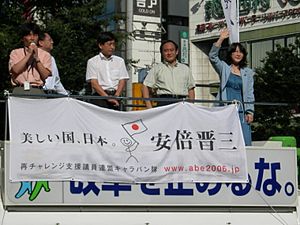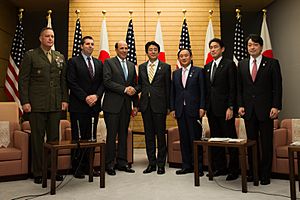Yoshihide Suga facts for kids
Quick facts for kids
Yoshihide Suga
|
|
|---|---|
|
菅 義偉
|
|
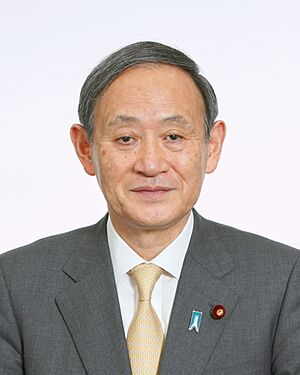
Official portrait, 2020
|
|
| Prime Minister of Japan | |
| In office 16 September 2020 – 4 October 2021 |
|
| Monarch | Naruhito |
| Deputy | Tarō Asō |
| Preceded by | Shinzo Abe |
| Succeeded by | Fumio Kishida |
| Vice President of the Liberal Democratic Party | |
| Assumed office 30 September 2024 |
|
| President | Shigeru Ishiba |
| Secretary-General | Hiroshi Moriyama |
| Preceded by | Tarō Asō |
| President of the Liberal Democratic Party | |
| In office 14 September 2020 – 29 September 2021 |
|
| Secretary-General | Toshihiro Nikai |
| Preceded by | Shinzo Abe |
| Succeeded by | Fumio Kishida |
| Chief Cabinet Secretary | |
| In office 26 December 2012 – 16 September 2020 |
|
| Prime Minister | Shinzo Abe |
| Preceded by | Osamu Fujimura |
| Succeeded by | Katsunobu Katō |
| Minister for Internal Affairs and Communications | |
| In office 26 September 2006 – 27 August 2007 |
|
| Prime Minister | Shinzo Abe |
| Preceded by | Heizō Takenaka |
| Succeeded by | Hiroya Masuda |
| Member of the House of Representatives | |
| Assumed office 20 October 1996 |
|
| Preceded by | Constituency established |
| Constituency | Kanagawa 2nd |
| Personal details | |
| Born | 6 December 1948 Yuzawa, Japan |
| Political party | Liberal Democratic |
| Spouse | Mariko Suga |
| Children | 3 |
| Alma mater | Hosei University (LLB) |
| Signature | |
Yoshihide Suga (菅 義偉, Suga Yoshihide, born 6 December 1948) is a Japanese politician. He served as the Prime Minister of Japan and leader of the Liberal Democratic Party (LDP) from 2020 to 2021. Before becoming prime minister, he was the Chief Cabinet Secretary for Prime Minister Shinzo Abe from 2012 to 2020. This is a very important role in the Japanese government.
Suga grew up on a strawberry farm in a rural part of Akita Prefecture. After high school, he moved to Tokyo and studied at Hosei University. He started his political career in 1975, working for a politician. Later, he was elected to the Yokohama Municipal Assembly in 1987. In 1996, he became a member of the House of Representatives, representing Kanagawa.
As a member of the Japanese Parliament, Suga became a close friend and supporter of Shinzo Abe. When Abe first became prime minister in 2006, he made Suga the Minister for Internal Affairs and Communications. Suga left this role a year later. However, when Abe became prime minister again in 2012, Suga was appointed Chief Cabinet Secretary. He held this position for a very long time, becoming the longest-serving Chief Cabinet Secretary in Japan's history.
In September 2020, Shinzo Abe decided to resign due to health reasons. Yoshihide Suga was then chosen to take his place as the leader of the LDP. Soon after, he was elected prime minister by the Diet and officially appointed by Emperor Naruhito.
During his time as prime minister, Suga mainly focused on dealing with the COVID-19 pandemic. This included making sure vaccines were given out across the country. He also oversaw the 2020 Summer Olympics and Paralympics in Tokyo, which were delayed because of the pandemic. Suga also announced a plan for Japan to become carbon neutral by 2050.
Even though he started with good public support, his approval ratings dropped. Many people were unhappy with how his government handled the pandemic and the Olympic Games. Because of this, Suga decided not to run for re-election in September 2021. His time as prime minister ended on October 4, 2021, when Fumio Kishida became the new leader.
Contents
Early Life and Education
Yoshihide Suga was born on December 6, 1948. His family were strawberry farmers in a rural area called Ogachi, which is now part of Yuzawa in Akita Prefecture. After finishing Yuzawa High School, he moved to Tokyo.
He studied at night school to earn a law degree from Hosei University in 1973. Suga chose Hosei University because it was the most affordable option for him. He worked in a cardboard factory in Tokyo to pay for his studies.
Political Journey
After university, Suga worked for a politician named Hikosaburo Okonogi for eleven years. In 1986, he decided to start his own political career. He was elected to the Yokohama City Council in April 1987. He campaigned by walking door-to-door, visiting many homes.
Suga also started the trend of giving speeches in front of busy train stations. This is now a common way for Japanese politicians to campaign. Even as a new councilor, he was very involved in important government decisions. People sometimes called him "the shadow mayor."
Becoming a Representative
Suga was elected to the Diet of Japan (Japan's parliament) in the 1996 election. He represented the Kanagawa 2nd district. He was re-elected several times in the following years.
In 2005, he became a Senior Vice Minister for Internal Affairs and Communications. The next year, in September 2006, he was promoted to Minister of Internal Affairs and Communications. He also helped create Japan's "hometown donation" (ふるさと納税, furusato nōzei) system. This system allows people to get tax deductions by donating money to local governments.
His unique campaigning style, speaking on "street corners," helped him keep his seat in the 2009 election. Many other politicians from his party lost their seats that year.
Role as Chief Cabinet Secretary
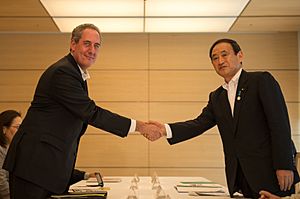
Yoshihide Suga stayed close to Shinzo Abe during the late 2000s and early 2010s. He encouraged Abe to run for the leadership of the LDP in 2012. Suga wanted Abe to focus on improving the economy.
After Abe won the 2012 election, Suga was appointed Chief Cabinet Secretary in December 2012. This is a very important role, like a top aide and manager for the prime minister. He also helped with issues related to military bases in Okinawa.
Suga held this position for a total of 2,820 days. This made him the longest-serving Chief Cabinet Secretary in Japanese history. He was a key part of the government's efforts to attract tourists and foreign workers. He also worked to lower mobile phone rates in Japan.
In 2019, Suga became well-known when he announced the name of Japan's new imperial era, Reiwa. This earned him the nickname "Uncle Reiwa." This event made more people see him as a possible future leader of the LDP.
Suga also played a key role in Japan's response to the COVID-19 pandemic in 2020. He believed that the way government departments worked separately made it harder to stop the virus from spreading.
Prime Minister of Japan (2020–2021)
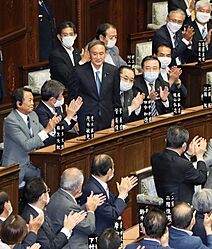
When Shinzo Abe announced he would resign in August 2020, Suga became a top candidate to replace him. He received support from many important figures in the LDP.
Suga was elected as the leader of the Liberal Democratic Party on September 14, 2020. He received 377 out of 534 votes.
After being elected, Suga shared his plans. He said his main goals were to handle the ongoing pandemic and to help the economy grow by reducing rules. He also wanted to lower mobile phone charges. Suga promised to continue the economic policies of his predecessor, known as Abenomics. He also wanted to keep working on the issue of Japanese citizens abducted by North Korea. He and his cabinet officially started their roles on September 16, 2020.
At his first press conference as prime minister, Suga said his main focus would be:
- Responding to the COVID-19 pandemic.
- Protecting jobs and helping businesses.
- Continuing Abenomics to revive the economy.
- Promoting digital transformation and reviewing supply chains.
International Relations
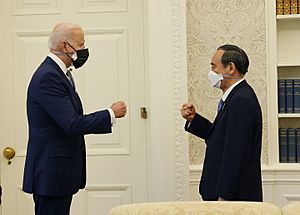

In October 2020, Suga made his first international trips to Vietnam and Indonesia. He aimed to strengthen Japan's relationships with Southeast Asian countries. He also signed an agreement to export defense equipment to Vietnam.
Suga also worked to build stronger ties with US President Joe Biden. They discussed the US-Japan security alliance, the COVID-19 pandemic, and climate change. Suga was the first foreign leader to visit President Biden at the White House in April 2021. They also agreed to work towards getting rid of nuclear weapons in North Korea.
Suga also promised to help Pacific nations. In July 2021, he offered 3 million COVID-19 vaccines to these countries. This was an effort to counter China's growing influence in the region. He also pledged help to countries like Tuvalu in their fight against climate change.
Public Opinion and Resignation
Suga's government saw its public approval ratings change a lot. They dropped from 74 percent in September 2020 to 42 percent in January 2021. This was partly due to public concern about the government's handling of the pandemic.
His approval ratings hit a very low point in May 2021, reaching 33 percent. This happened as coronavirus cases increased in the Tokyo area. In July and August, while Tokyo hosted the Tokyo 2020 Olympic Games during the pandemic, his approval ratings dropped even further, to 31% and then 28%.
On September 3, 2021, Suga announced that he would not seek re-election as the head of his party. This decision came as his approval ratings were at an all-time low. Japan was also facing its worst wave of COVID-19 infections. His resignation became official on September 30, 2021.
On September 29, 2021, the LDP elected former foreign minister Fumio Kishida as their new leader. Kishida then replaced Suga as Prime Minister on October 4, 2021.
Personal Life
Suga is married to Mariko, and they have three sons. Mariko is the sister of one of his former co-workers.
Suga has a daily fitness routine. He does 100 situps and walks for 40 minutes every morning. He also does 100 situps every night. He started this routine after a doctor told him to lose weight, and he lost 14 kg (about 31 pounds) in four months. He also loves to read and reads all major newspapers daily.
When he was a college student, Suga practiced karate. He holds a third-degree black belt in karate.
Suga is known to enjoy sweets, and his favorite food is pancakes. For lunch, he almost always eats soba noodles.
See also
 In Spanish: Yoshihide Suga para niños
In Spanish: Yoshihide Suga para niños
- Tohokushinsha Film and Ministry of Internal Affairs and Communications scandal
 | Calvin Brent |
 | Walter T. Bailey |
 | Martha Cassell Thompson |
 | Alberta Jeannette Cassell |


